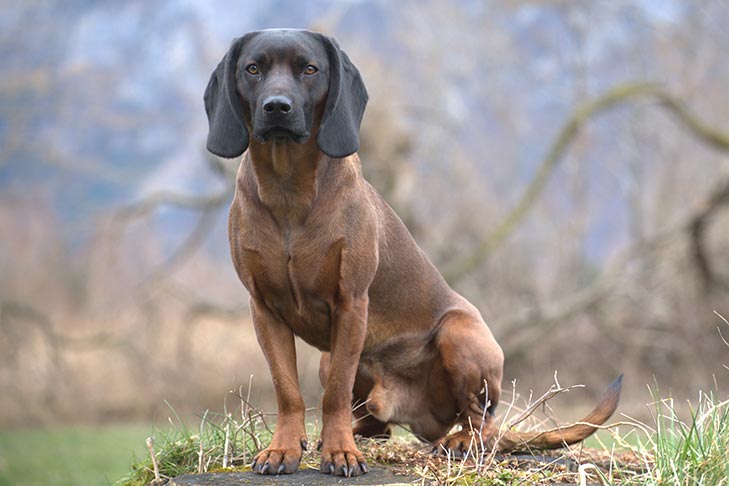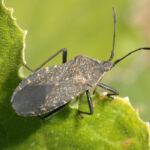Bavarian Mountain Hound: History, Facts, Size, Habitat, Classification
Bavarian Mountain Hound, also known as Bavarian Bloodhound, is a remarkable breed of dog that has a fascinating history. This unique breed originated in Germany and was specifically bred for hunting purposes. In the early 19th century, breeders aimed to develop a dog that possessed exceptional scent tracking abilities and could navigate the challenging terrains of the Bavarian mountains. Thus, the Bavarian Mountain Hound was created, which quickly gained popularity due to its remarkable hunting skills.
This breed is medium-sized, with males typically weighing between 66 to 77 pounds and females weighing slightly less. The Bavarian Mountain Hound has a sleek and muscular body, enabling it to move quickly and efficiently through mountains and forests. Their distinctive appearance includes a short, dense coat with a handsome tricolor pattern, consisting of black, tan, and fawn markings.
These hounds thrive in natural habitats such as forests and mountainous regions. Their exceptional sense of smell allows them to track animals and scents over vast distances. Bavarian Mountain Hounds are particularly adept at tracking game like deer, boar, and foxes. Their strong prey drive and agility make them excellent hunting companions for experienced hunters.
In terms of classification, the Bavarian Mountain Hound falls under the category of scent hounds. These dogs have an incredible sense of smell, allowing them to detect scents that humans cannot perceive. They are widely hailed as skilled scent trackers due to their exceptional ability to follow trails and locate hidden animals during hunts.
In conclusion, the Bavarian Mountain Hound is a remarkable breed with a rich history and exceptional hunting abilities. Their medium size, sleek appearance, and strong sense of smell make them well-suited for hunting in mountainous terrains. Stay tuned for more interesting articles on various animal breeds, as our blog already features over 155 fascinating animals.
History of Bavarian Mountain Hound
The Bavarian Mountain Hound is an animal with a rich and interesting history. This breed of dog originates from the Bavarian region of Germany and has been around for hundreds of years. It was specifically bred for hunting purposes, particularly for tracking and chasing game in the mountainous terrain of Bavaria.
During the 19th century, hunting became a very popular sport among the noble classes in Germany. They needed a dog that could navigate the challenging terrain of the Bavarian mountains and have a great sense of smell to track down game. This led to the development of the Bavarian Mountain Hound, which possessed all the necessary qualities for a successful hunting dog.
The breed was officially recognized by the German Kennel Club in 1912 and has since become quite popular not only in Germany but also in other countries around the world. It is known for its tenacity, athleticism, and keen sense of smell. The Bavarian Mountain Hound is often used to track and chase various animals, including deer, wild boar, and foxes.
In conclusion, the Bavarian Mountain Hound is a breed of dog that has a long history and was specifically bred for hunting purposes in the Bavarian mountains. Its skills and characteristics have made it a popular choice for hunters not only in Germany but also in other parts of the world.
Importance of Bavarian Mountain Hound
The Bavarian Mountain Hound is an important animal for several reasons. First, they are excellent hunting dogs. They have a strong sense of smell and can track down animals like deer and wild boar. This is helpful for hunters who depend on these dogs to locate game and guide them during the hunt.
Secondly, Bavarian Mountain Hounds are known for their loyalty and intelligence. They are quick learners and can be trained easily. This makes them useful not only for hunting purposes but also as family pets. They are known to be loving and gentle with children, making them great companions for families.
Lastly, Bavarian Mountain Hounds are an essential part of preserving wildlife populations. As hunting dogs, they help in controlling animal populations by tracking down and controlling game numbers. This is vital for maintaining a healthy balance in the ecosystem, as an overpopulation of certain animals can negatively impact the environment.
In conclusion, the Bavarian Mountain Hound is not only a skilled hunting dog but also a loyal and intelligent pet. They help hunters find game and guide them during the hunt, making them an important tool for hunters. Additionally, their ability to control animal populations is crucial for maintaining a healthy ecosystem.
Amazing Facts About Bavarian Mountain Hound
1. The Bavarian Mountain Hound is a breed of dog known for its hunting abilities.
2. They originated in Germany and were developed for tracking and trailing wounded game.
3. These dogs have a strong and muscular build, with a well-proportioned body.
4. Their coat is short and dense, which helps protect them during their outdoor adventures.
5. Bavarian Mountain Hounds are typically black and tan in color, with a distinctive saddle pattern on their back.
6. They have a keen sense of smell and excellent tracking skills, giving them the ability to follow even the faintest scent trails.
7. These dogs are known for their intelligence and trainability, making them great working partners.
8. Bavarian Mountain Hounds are generally friendly and loyal towards their family and are known to be good companions.
9. They are active dogs that require regular exercise to keep them physically and mentally stimulated.
10. Due to their hunting instincts, they may have a strong prey drive and may not be suitable for households with small pets.
11. These dogs are not typically aggressive but can be reserved or cautious around strangers.
12. Bavarian Mountain Hounds enjoy being part of a pack and prefer the company of their family members.
13. They may not do well when left alone for long periods and thrive in households where someone is usually present.
14. These dogs have a moderate barking tendency and may alert their owners of unfamiliar sounds or approaching persons.
15. Despite their hunting nature, Bavarian Mountain Hounds can also make excellent family pets as long as their exercise and socialization needs are met.
Can we keep Bavarian Mountain Hound as our Pet?
The Bavarian Mountain Hound is a beautiful and fascinating animal, but unfortunately, it is not suitable to be kept as a pet. This breed is not commonly kept in homes because it is a working dog with specific needs and characteristics. It is important to understand that not all animals are suitable or safe to keep as pets.
The Bavarian Mountain Hound is currently not extinct, but it is not recommended as a pet due to its nature as a hunting dog. This breed is known for its incredible scenting abilities and strong hunting instincts. It requires a lot of space, exercise, and mental stimulation to be happy and healthy. Since most families cannot provide such an environment and lifestyle for this breed, it is not a good choice for a pet.
Keeping an animal as a pet requires a lot of responsibility and understanding of its natural behaviors and needs. If the Bavarian Mountain Hound were to become extinct in the future, it would be even more crucial to respect and protect these creatures in the wild. Extinction occurs when a species completely disappears from the Earth, usually due to human activities or environmental changes. When an animal becomes extinct, we lose a unique and precious part of our natural world, and it becomes impossible to keep them as pets.
In summary, the Bavarian Mountain Hound is not suitable to be kept as a pet due to its hunting instincts and specific needs. While it is not currently extinct, if it were to become extinct, it would be a great loss to our planet. It is important to remember that not all animals can or should be kept as pets, and it is our responsibility to protect and preserve their natural habitats.
Size of Bavarian Mountain Hound
The Bavarian Mountain Hound is a medium-sized dog breed that originated in Germany. They have a sturdy body with a muscular build. These dogs are known for their strong and agile nature, which makes them excellent hunting companions.
On average, male Bavarian Mountain Hounds stand about 19 to 20 inches tall at the shoulder and weigh between 55 to 80 pounds. Females are slightly smaller, with a height of around 18 to 19 inches and a weight range of 44 to 70 pounds. It’s important to note that these are just averages, and individual dogs may vary in size.
Despite their medium size, Bavarian Mountain Hounds have a strong and robust appearance. They have a well-developed chest, strong legs, and a deep muzzle. Their ears are medium in length, drooping down along the sides of their face. Their coat is thick and dense, making it suitable for colder climates. The coat color is usually a combination of black, tan, and sometimes a touch of white.
Overall, Bavarian Mountain Hounds are known for their medium-sized stature and muscular build. They are strong, agile, and have an impressive physical presence. Despite their size, they are friendly and sociable dogs that can make excellent family pets, especially for those who enjoy outdoor activities and want a loyal and active companion by their side.
Habitat of Bavarian Mountain Hound
The Bavarian Mountain Hound is a beautiful and unique animal that calls the forests and hills of the Bavarian region in Germany its home. These dogs are superb hunters and are well-adapted to this specific environment. Their habitat provides them with everything they need to survive and thrive.
In the Bavarian mountains, the terrain is rugged and the climate is mostly cool and moist. The tall trees of the forests provide the perfect cover for the Bavarian Mountain Hounds to hide and search for their prey. They are excellent at navigating through the dense undergrowth, thanks to their strong and sturdy legs. These dogs also have superior scenting abilities, allowing them to track animals over great distances.
The Bavarian Mountain Hounds prefer to live in packs, making the hills and forests their home. The abundant wildlife in the area offers them a steady source of food. They primarily hunt for game, such as deer, boars, and foxes. These dogs are known for their endurance and agility, which helps them in chasing down their prey.
Overall, the habitat of the Bavarian Mountain Hound is the perfect blend of thick forests, rolling hills, and diverse wildlife. These dogs have adapted over time to this unique environment and have become excellent hunters. Their survival and success in this habitat are a testament to their remarkable abilities and their harmony with the Bavarian mountains.
Evolution of Bavarian Mountain Hound
The Bavarian Mountain Hound Animal has evolved over thousands of years to become the strong and agile creature we know today. It all started long ago when their ancestors roamed the wilderness. These early animals were hunters, relying on their keen senses and sharp teeth to catch their prey.
As time went on, these animals faced different challenges in their environment. They had to adapt to changes in the climate and the types of food available. Over many generations, those with characteristics that helped them survive, like strong legs for running or a keen sense of smell for tracking prey, were more likely to pass on their genes to the next generation.
One notable aspect of the Bavarian Mountain Hound Animal’s evolution is its ability to work closely with humans. They were selectively bred by humans to exhibit certain traits, such as a strong hunting instinct and a loyal nature. This allowed them to become valuable companions in the hunting of larger game, such as deer or boar.
Overall, the Bavarian Mountain Hound Animal has come a long way from its ancestors. Through the process of evolution, it has developed the skills and characteristics necessary to thrive in its environment. Today, it remains a remarkable example of nature’s ability to adapt and change over time.
Classification of Bavarian Mountain Hound
The Bavarian Mountain Hound is a type of animal that falls into the broader classification of dogs. Dogs are a special kind of animal that people often keep as pets or use for various purposes, such as hunting or guiding people who are visually impaired. The Bavarian Mountain Hound, specifically, belongs to the group of scent hounds. These dogs have an exceptional sense of smell and are skilled at tracking scents, which makes them great for hunting and tracking activities.
In terms of appearance, the Bavarian Mountain Hound is a medium-sized dog with a sturdy body and strong legs. They have a short, dense coat that helps protect them from harsh weather conditions when they are out in the mountains. Their coat is usually black with markings of a tanned or fawn color, giving them a distinctive and beautiful appearance.
When it comes to temperament, the Bavarian Mountain Hound is known for being friendly, affectionate, and intelligent. They are typically loyal and enjoy being around their human companions. Due to their hunting background, they have a strong prey drive and may have a tendency to chase after small animals. However, with proper training and socialization, they can become well-behaved and obedient pets.
In conclusion, the Bavarian Mountain Hound is a breed of dog that belongs to the scent hound group. They have a medium-sized body, a short and dense coat, and are known for their friendly and intelligent nature. These dogs make great companions and can excel in hunting and tracking activities due to their excellent sense of smell.
Different Types of Bavarian Mountain Hound
1. Appearance: Bavarian Mountain Hound animals have a robust, medium-sized body with a strong build. They have a short, dense coat that comes in shades of tan with a black saddle on their back, giving them a distinctive and attractive appearance.
2. Great sense of smell: These animals are known for their exceptional sense of smell, which is their most outstanding feature. Their powerful noses enable them to track scents over long distances, making them excellent hunting companions or search and rescue dogs.
3. Athletic and agile: Bavarian Mountain Hounds are agile and athletic creatures. They have a well-muscled body that allows them to navigate through rough terrain and overcome obstacles. Their physical prowess enables them to excel in various activities, including dog sports like agility or flyball.
4. Intelligent: These animals are highly intelligent and quick learners. They possess a natural problem-solving ability, which makes them easy to train. With proper guidance and positive reinforcement, they can quickly grasp commands and tasks, making them a joy to work with and train.
5. Companionable nature: Bavarian Mountain Hounds have a friendly and sociable nature. They bond strongly with their families and enjoy spending time with their human companions. They make loyal and affectionate pets and are excellent with children, making them a great addition to any household.
6. Excellent hunting abilities: Originally bred for hunting, these animals have retained their exceptional hunting instincts. With their keen sense of smell, stamina, and determination, they excel at tracking game, especially wounded animals. They are highly regarded as skilled hunting dogs, particularly for tracking deer and other large game.
7. Good temperament: Bavarian Mountain Hounds typically have a calm and even-tempered disposition. They are rarely aggressive and get along well with other dogs, making them suitable for multi-pet households. Their balanced temperament and friendly nature make them a pleasure to live and work with.
8. Endurance: These animals possess impressive endurance, allowing them to cover long distances without getting tired. This stamina makes them ideal companions for outdoor activities such as hiking, jogging, or participating in dog sports requiring physical endurance.
9. Versatile working dog: Besides hunting, Bavarian Mountain Hounds can be trained for various other tasks. They excel in search and rescue work, due to their tracking abilities. They can also participate in obedience trials, tracking trials, or become therapy dogs due to their calm and friendly nature.
10. Low-maintenance grooming: The Bavarian Mountain Hound’s short coat requires minimal grooming. Regular brushing to remove loose hair and occasional bathing are usually sufficient to keep their coat in good condition. Their low-maintenance grooming needs make them an excellent choice for individuals or families looking for a hassle-free pet.
Geographical Presence of Bavarian Mountain Hound
The Bavarian Mountain Hound is found in the region of Bavaria, which is located in southern Germany. This region is known for its beautiful landscapes and mountains, and it is here that the Bavarian Mountain Hound thrives. With its strong build and keen sense of smell, this breed of dog is highly skilled in tracking and hunting in the mountainous terrain.
However, the Bavarian Mountain Hound is not found in other parts of the world. It is specific to the Bavarian region of Germany and has not been widely bred or distributed elsewhere. This makes it a unique and special breed that is treasured by the people of Bavaria.
In addition to being confined to Bavaria, the Bavarian Mountain Hound is also not commonly seen in urban areas. This is because its abilities are more suited to the natural environment found in the mountains. As a scenthound, it requires ample space to exercise and explore, which can be challenging to provide in crowded cities.
To summarize, the Bavarian Mountain Hound is found in the mountainous region of Bavaria in Germany. It is not found in other parts of the world and is not often seen in urban areas. This breed is specifically adapted to the unique landscapes of Bavaria and is prized for its hunting abilities and strong sense of smell.
Scientific Name of Bavarian Mountain Hound
The scientific name for the Bavarian Mountain Hound, a dog breed, is Canis lupus familiaris. This name is commonly used by scientists around the world to identify this particular type of dog. The first part of the name, Canis lupus, refers to the species of wolf from which all domestic dogs have descended. The second part, familiaris, indicates that the breed is a domesticated or tamed version of the wolf.
The Bavarian Mountain Hound is a hunting dog that originated in Germany. It is known for its keen sense of smell and tracking abilities, which make it a valuable companion for hunters. With its short coat and muscular build, this breed is well-suited to outdoor activities and can withstand harsh weather conditions. The Bavarian Mountain Hound’s characteristics make it an excellent choice for tracking game in mountainous regions.
In summary, the Bavarian Mountain Hound belongs to the species Canis lupus familiaris, which includes all domesticated dogs. This breed is highly valued for its hunting skills and is specially adapted for tracking game in the mountains. Its scientific name helps scientists and experts worldwide identify and classify this unique and remarkable type of dog.
Diet of Bavarian Mountain Hound
The diet of the Bavarian Mountain Hound is an important aspect of their health and well-being. These animals require a balanced and nutritious diet to stay healthy and active. They have specific dietary needs that should be met to ensure they live a long and happy life.
The first paragraph could start by explaining that the Bavarian Mountain Hound’s diet should consist mainly of high-quality dog food. It’s important to choose dog food that is specifically formulated for their age, size, and activity level. The food should contain a good balance of protein, carbohydrates, and fats to provide them with the necessary energy and nutrients.
In the second paragraph, you can mention that it’s important to avoid feeding them human food, as it may not provide the right nutrients they need and can even be harmful to their health. Some human foods can be toxic to dogs, such as chocolate, grapes, and onions. It’s also crucial to avoid overfeeding them, as obesity can lead to various health issues, including joint problems and heart disease.
The final paragraph can emphasize the importance of providing fresh water at all times. Water is essential for the Bavarian Mountain Hound’s overall health and digestion. Proper hydration is crucial, especially during hot weather or after strenuous physical activity. It’s also important to regularly monitor their weight and adjust their diet accordingly to maintain a healthy body condition. Seeking the advice of a veterinarian can be helpful in determining the most suitable diet plan for these dogs.
Locomotion of Bavarian Mountain Hound
The Bavarian Mountain Hound is known for its strong and agile locomotion. It moves swiftly and gracefully, making it well-suited for the outdoors. When it runs, its movements are smooth and steady, allowing it to cover great distances without getting tired easily. It uses its powerful legs to leap over obstacles and navigate rough terrains with ease.
The Bavarian Mountain Hound has a trotting gait, which means it moves by taking quick and light steps. This helps it maintain balance and stability while moving at a steady pace. Its hind legs push off the ground forcefully, propelling it forward with each stride. The front legs reach out in a smooth motion, allowing it to move with efficiency. Overall, the Bavarian Mountain Hound’s locomotion is well-adapted to its environment, making it an excellent companion for outdoor activities like hiking or hunting.
Social and Sexual Behaviour of Bavarian Mountain Hound
The social behavior of Bavarian Mountain Hound animals is quite interesting. These animals, like many other hunting dogs, are often trained to work together in teams. They understand the importance of cooperation and rely on each other during hunts. They communicate with each other through various sounds and body movements. This helps them coordinate their actions and increase their chances of success.
When it comes to sexual behavior, Bavarian Mountain Hound animals typically mate during specific periods of the year. This is known as the breeding season. During this time, male hounds may mark their territory and display certain behaviors to attract the attention of females. Once a male successfully attracts a female, they engage in a mating ritual to reproduce and have offspring.
These behaviors are essential for the survival of the Bavarian Mountain Hound species. By working together, they can efficiently hunt and secure food for themselves and their pack. And by mating during the right time, they ensure the continuation of their species. It’s fascinating to observe how these animals follow specific social and sexual behaviors that help them thrive in their environment.
Reproduction and Lifecycle of Bavarian Mountain Hound
The Bavarian Mountain Hound, like many other animals, goes through a process called reproduction in order to create new beings. Reproduction is when an animal makes baby animals. These baby animals grow up and become adults, just like their parents. The life cycle of a Bavarian Mountain Hound involves different stages.
The first stage of the life cycle is when a male Bavarian Mountain Hound meets a female Bavarian Mountain Hound. They come together and mate, which means they have a special kind of cuddle. During this cuddle, the male’s sperm goes inside the female’s body. This is how they make baby Bavarian Mountain Hounds.
Next, the female Bavarian Mountain Hound carries the baby animals inside her body. This is called pregnancy. After some time, she gives birth to the baby Bavarian Mountain Hounds. They are very small when they are born, but they quickly grow up. They learn from their parents how to run, hunt, and be strong.
Finally, the baby Bavarian Mountain Hounds grow into adults. They follow the same life cycle as their parents and have babies of their own. This cycle continues, with new generations being born and growing up. It is important for the survival of the Bavarian Mountain Hound species. Understanding the life cycle and reproduction of animals helps us to appreciate and take care of them.
Threats to Bavarian Mountain Hound
The Bavarian Mountain Hound faces several threats in its natural habitat. One major threat is the loss of its habitat due to deforestation. Many forests where these hounds used to live are being cut down to make space for buildings, roads, and agriculture. This leaves the Bavarian Mountain Hound with less space to roam and find food, which can have a negative impact on their population.
Another threat to these hounds is hunting. Sadly, some people hunt them for sport or to protect their livestock. This puts the Bavarian Mountain Hound in danger and can lead to a decline in their numbers. Additionally, illegal hunting and poaching pose a significant threat to these animals. Poachers hunt the Bavarian Mountain Hound for their fur or body parts, which are sometimes used in traditional medicines. This cruel practice further reduces their population and poses a risk to their survival.
Lastly, climate change is affecting the Bavarian Mountain Hound as well. With the changing climate, their natural environment is also changing. Extreme weather conditions such as intense heatwaves or heavy rainfall can disrupt their feeding and breeding habits. As a result, their population may be negatively impacted, as they struggle to adapt to the new conditions.
In conclusion, the Bavarian Mountain Hound faces threats like habitat loss, hunting, poaching, and climate change. These dangers put their population in danger and affect their ability to survive. It is crucial for us to raise awareness about these issues and work towards protecting these beautiful animals and their natural habitat.
Population of Bavarian Mountain Hound
The population of the Bavarian Mountain Hound animal is estimated to be around 1,000 to 2,000 individuals globally. These dogs are mostly found in Bavaria, a region in Germany, where they were originally bred for hunting purposes. The breed is known for its strong scenting ability and versatility in tracking various types of game.
However, it is important to note that the Bavarian Mountain Hound is not an endangered animal. In fact, it is quite a rare breed, but it is not currently facing the threat of extinction. Efforts are being made by breed enthusiasts and organizations to maintain and conserve the population of these dogs to ensure their continued existence.
If the Bavarian Mountain Hound were to become extinct, it would be a sad loss for dog lovers and hunters alike. Their excellent tracking skills and adaptability to mountainous terrain make them valuable companions for hunting activities. It is essential to continue to protect and conserve this unique breed to prevent this from happening and to preserve the breed’s heritage for future generations.
Conclusion
The Bavarian Mountain Hound is a fascinating and unique animal that has a rich history and many interesting facts. This blog post has provided a detailed exploration of the Bavarian Mountain Hound, including its history, facts, size, habitat, and classification.
Throughout the blog, we have discovered that the Bavarian Mountain Hound has a long lineage, having been developed in the mid-19th century by a German monk named Saint Hubert. This breed was originally meant for hunting purposes, specifically tracking down wounded animals. Today, they are still highly valued for their exceptional scenting abilities and are commonly used for tracking game.
In terms of facts, the Bavarian Mountain Hound is known for its strong and muscular build, with males typically being larger than females. They have a dense and short coat that protects them in harsh weather conditions. Their sturdy body allows them to navigate through difficult terrain effortlessly, making them excellent hunters.
When it comes to their habitat, Bavarian Mountain Hounds are versatile and adaptable. They can thrive in various environments, from mountainous regions to forests, as long as they have enough space for exercise. Additionally, these hounds are classified as a member of the scent hound group, which emphasizes their exceptional sense of smell and tracking abilities.
In conclusion, the Bavarian Mountain Hound is an extraordinary animal with a captivating history, fascinating facts, and unique characteristics. Their strength, intelligence, and ability to track make them a valuable asset for hunting and tracking activities. These hounds are not only impressive in their abilities, but they also make loyal and loving companions. It is important to appreciate and respect the Bavarian Mountain Hound for the remarkable animal it is.
Frequently Asked Questions about Bavarian Mountain Hound (FAQ’s)
Q1: What is a Bavarian Mountain Hound?
A1: The Bavarian Mountain Hound is a breed of hunting dog that originated in Germany.
Q2: What is the average size of a Bavarian Mountain Hound?
A2: The average height of a Bavarian Mountain Hound is around 18-20 inches, and they typically weigh between 40-55 pounds.
Q3: Are Bavarian Mountain Hounds good family pets?
A3: Yes, they can make good family pets as they are known for being loyal and good with children.
Q4: Do Bavarian Mountain Hounds require a lot of exercise?
A4: Yes, they are an active breed and require regular exercise to keep them physically and mentally stimulated.
Q5: Are Bavarian Mountain Hounds easy to train?
A5: Bavarian Mountain Hounds are intelligent and eager to please, making them generally trainable. However, consistency and positive reinforcement are key for successful training.
Q6: Are Bavarian Mountain Hounds good with other pets?
A6: With proper socialization, Bavarian Mountain Hounds can get along well with other pets in the household.
Q7: Do Bavarian Mountain Hounds shed a lot?
A7: Yes, they have a short, dense coat that sheds moderately. Regular brushing can help manage the shedding.
Q8: How long do Bavarian Mountain Hounds live?
A8: On average, Bavarian Mountain Hounds have a lifespan of 10-14 years.
Q9: Are Bavarian Mountain Hounds prone to any specific health issues?
A9: They are generally a healthy breed, but like other dogs, they can be prone to certain health conditions such as hip dysplasia and ear infections.
Q10: Can Bavarian Mountain Hounds adapt well to apartment living?
A10: Ideally, Bavarian Mountain Hounds need a fenced yard to explore and exercise. However, with sufficient exercise and mental stimulation, they can adapt to apartment living.
Q11: Are Bavarian Mountain Hounds good watchdogs?
A11: Yes, they have a strong sense of smell and are naturally alert, making them good watchdogs.
Q12: Can Bavarian Mountain Hounds be left alone for long periods?
A12: No, they are social dogs and can experience separation anxiety if left alone for extended periods. It is important to provide them with companionship and mental stimulation.
Q13: Are Bavarian Mountain Hounds suitable for first-time dog owners?
A13: While they are generally friendly and trainable, their active nature and exercise needs might make them more suitable for experienced owners.
Q14: Do Bavarian Mountain Hounds have a strong prey drive?
A14: Yes, being a hunting breed, Bavarian Mountain Hounds have a strong prey drive and may chase smaller animals if not properly trained and socialized.
Q15: Are Bavarian Mountain Hounds good swimmers?
A15: Yes, they are known for their swimming abilities and can enjoy water activities with appropriate supervision.

Hey there, I’m Tyler Swan! I worked as an Animal Care Specialist at Neuralink and completed my education at the University of California, Davis. Animals have always fascinated me, so I chose to study and work with them.
In my job, I take care of animals and make sure they’re healthy and happy. I’ve had cool roles like Lab Manager and Senior Research Assistant at Mitloehner Lab, where I’ve learned much about animals.
I’m not just about work, though. I love animals so much that I write articles about them! I enjoy sharing fun and interesting facts about our furry and feathered friends.
If you ever want to know more about animals or need help with animal info, ask! I’m here to make learning about animals easy and fun, just like chatting with friends.












